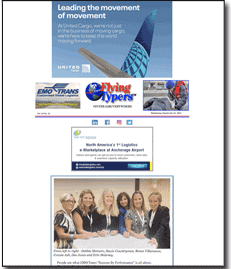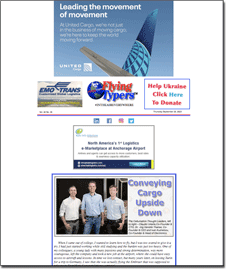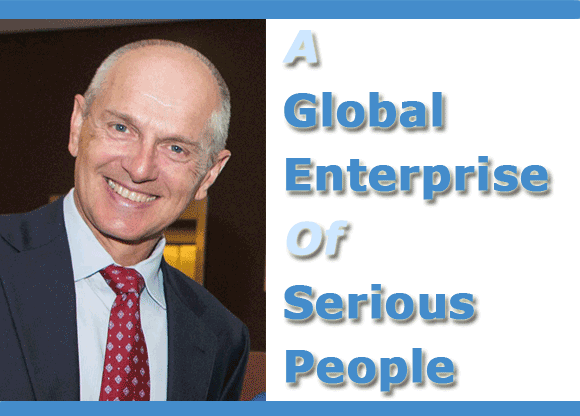 |
Marco Rohrer is President and CEO of
EMO Trans, the logistics enterprise FlyingTypers has featured on several
occasions. Not a difficult choice, in view of the prominent profile of
this company, which we shall see has a distinctively human approach to
logistics. All this is given without forgetting the strong bond of friendship
between Geoffrey Arend and Jo Frigger, who sadly passed away in April
2021.
Marco Rohrer grew up in Zurich, Switzerland,
and completed his apprenticeship in 1978, earning a diploma in freight
forwarding from the KV Zurich Business School. He moved to the USA in
1980 and worked for various logistics companies in executive positions
with increasing responsibilities. After obtaining a US customs broker
license in 1993, Marco joined EMO Trans in 1995 as Executive Vice President
and partner, directing sales and operations in the US West Coast South
region. In line with his Swiss origin, Marco Rohrer loves hiking and climbing
in the local mountains, fishing, and playing soccer. Cynthia Rohrer has
been his wife for over 30 years and they have three children and one grandchild
now.
With such a strong personality our friend
Karin Frigger, who is now Chairwoman of EMO Trans Inc., can be assured
that the legacy left by her husband Jo is placed in good hands. EMO Trans
registered an important success at the global convention this month of
September, which the FT covered with a balanced approach.
On the occasion Marco Sorgetti had the opportunity
to entertain a brief conversation on behalf of FT with Mr. Rohrer. We
are pleased to publish its essential part for our readers within this
article. Rohrer’s are straightforward statements of his clear intentions,
provided with a language that leaves no doubt about his ambitious plans.
FT: Mr.
Rohrer, you are at the helm of an impressive forwarding and logistics
business covering 120 countries. The map of the world on your website
speaks for itself in this regard. How do you see the growth of your services
in September 2023 in the different regions covered by your network?
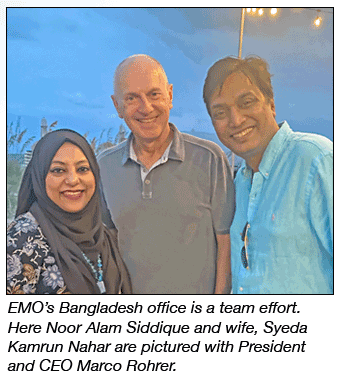 MR:
Due to the sluggish economy, we see very little
growth for the remainder of 2023. International freight volumes are down,
the rates are suppressed, and there is nothing on the horizon to indicate
this will change any time soon. This year we added our own offices in
Bangladesh, Indonesia, and India. We see tremendous growth opportunities
in these areas, especially India where we have a significant presence
with six fully operational offices. MR:
Due to the sluggish economy, we see very little
growth for the remainder of 2023. International freight volumes are down,
the rates are suppressed, and there is nothing on the horizon to indicate
this will change any time soon. This year we added our own offices in
Bangladesh, Indonesia, and India. We see tremendous growth opportunities
in these areas, especially India where we have a significant presence
with six fully operational offices.
All things considered, the EMO Trans Group
is performing well, and operating results are satisfactory. we are fortunate
to be in a strong financial position that enables us to stay focused and
execute on our worldwide strategy.
We have made huge investments in technology
and began the rollout of CargoWise earlier this year. Andy Richardson
and his team have devoted many hours to training and connecting our global
offices. I’d like to thank the IT Team and our EMO offices around
the world, who have embraced the change to a company-wide operating system.
FT: Freight
forwarders use all modes of transport. Do you expect some changes in their
future balance, in particular with regard to the announced rate increase
in the U.S. maritime market? Elsewhere? Is there a prevailing mode in
the various EMO Trans services?
MR: We
pride ourselves on offering our clients a wide range of services in all
modes of transportation. Ocean freight is the biggest segment, but most
of our clients also use us for their air freight shipments. Trucking is
a growing segment that we will pay more attention to in the future.
FT: In
a way it is interesting to see that the typically European debate on modal
shift (and the so far unachieved rebalancing of freight carriage to more
environmentally friendly modes of transport, from road to rail, or intermodal)
appears in a different light in EMO Trans’s approach, which is putting
now more attention on the road: a good message for some, we daresay.
Your website defines your approach as “Customized
global logistics”. In a way this is a daunting challenge. How can
you conciliate the global and the customized approach?
MR: Our
business model requires the employment of a very knowledgeable salesforce
to provide our clients with customized logistics solutions. Therefore,
our sales approach is focused on consultation and aligning our services
with our clients’ unique requirements.
FT: What
is the role of diversity in your organization?
MR: Diversity,
Equity, and Inclusion (DEI) is a priority for our company and has the
attention of our senior management. We have formed an internal committee
to bring awareness and education to the topic. All our employees have
received training, and new hires go through mandatory DEI training as
part of the onboarding process.
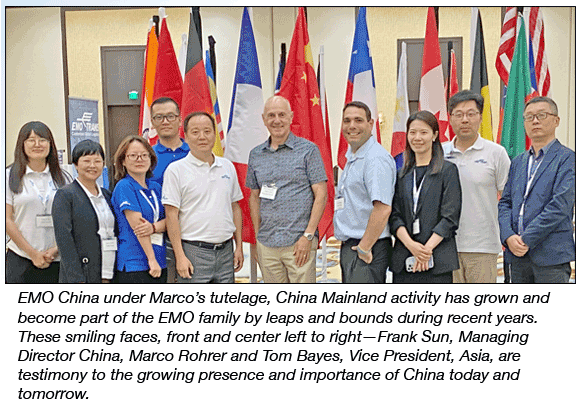 |
FT: Evidence
exists that a wise, balanced and informed approach to employment does
pay back. What logistics industry need now more than ever is knowledgeable
staff with a diverse cultural approach, able to extract the enormous value
from global trade’s diversity. Can you address your expansion in
China?
MR: In
2015 we opened EMO Trans China after several years of operating a Representative
office in Shanghai. In the past two years, EMO Trans China has expanded
our presence throughout the country with office locations in Beijing,
Chengdu, Ningbo, Qingdao, Shenzhen, Tianjin, and Xiamen.
EMO Trans China has grown organically as
we have gained great strength in the Asian market. Each China office is
managed and operated with the highest level of local expertise and ethical
standards. Our knowledge with the regional culture along with the strong
relationships we have built with carriers, suppliers and vendors allows
EMO Trans China to successfully satisfy our global customers’ needs.
FT: Starting
in 1965 your business grew exponentially in less than 60 years. How do
you view current and future prospects for your company? What is your top
business priority right now?
MR: As
a globally operating mid-size freight forwarder, we are uniquely positioned
to take on competitors of all sizes. Our future growth prospects are excellent.
Our priority is to improve global IT infrastructure, product development,
and expand our global footprint.
FT: “Some
of our customers have been with us for decades, they have stayed because
they recognize that beyond rate tariffs and automated processes, the relationships
we build add value.” FT has been honored to count Jo Frigger
as a close friend for many years, so we know very well how truthful this
statement is. We wonder whether EMO Trans have a special strategy regarding
customer satisfaction and retention or is this just the result of undisturbed
logistics performance.
MR:
Our main priority has always been preserving our existing clients. This
goes hand in hand with retaining key personnel to serve those clients.
Continuity, consistency, and reliability are fundamental to that approach.
The importance of staff retention come to light
here as part of the EMO Trans’s strategy. As our readers know this
topic was already featured in other interviews, for example when we talked
to Nicolette van der Jagt of CLECAT earlier this year.
This being said there are also other priorities
in Mr. Rohrer’s agenda, as we read here below.
FT: If
you had to name three great challenges in your daily business, what would
come 1st? And 2nd?
MR:
First is information technology. We have made huge investments in technology
and began the rollout of CargoWise earlier this year. Andy Richardson
and his team have devoted many hours to training and connecting our global
offices. I’d like to thank the IT Team and our EMO offices around
the world, who have embraced the change to a company-wide operating system.
Second is procurement. Procurement is an area
of great concern as it is volume-driven and one of the greatest challenges
for a mid-sized company like EMO Trans. We have formed global teams for
air and ocean freight that are tasked with securing competitive pricing
and space. The teams are also focused on product development, and we have
successfully implemented air and ocean consolidations in ORD, LAX, ATL,
and JFK, with other hubs to follow in the near future. EMO Germany has
operated the biggest consolidation gateway in Frankfurt for many years
and continues to expand to many new destinations.
Third is staffing. We have seen an increase in
Millennial and Gen Z employees, who now account for 41% of our EMO USA
workforce. Globally, the percentage is even higher. Considering these
changes, we have implemented a hybrid work policy that caters to both
older and younger generations. While recent studies suggest that remote
work reduces productivity by 8%, we believe that offering a better work/life
balance to our staff outweighs this loss in productivity. Motivated, engaged
employees provide better service for our clients.
FT: What
is your view of advanced analytics as leveraging data techniques like
machine learning (AI), deep learning (as a subset of machine learning),
and does agile software development emerge increasingly important in freight
forwarding in general?
We hear 85% of the action has yet to embrace
AI. What are your views on the subject? Have you made investments in this
direction yet, or do you see your company ready to take the leap?
MR:
We are already using various software programs utilizing AI, and this
will continue to grow. We will continue to automate our processes, but
our clients will always have an opportunity to reach someone in person.
Generic, repetitive processes should be fully automated, but irregularities
will require human intervention.
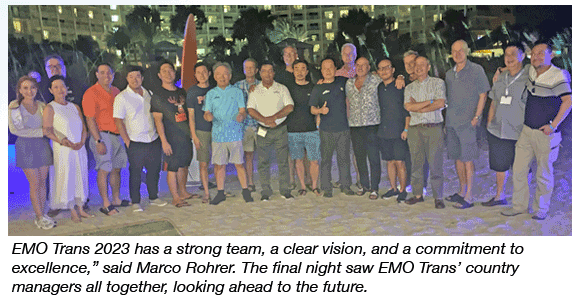 |
FT:
We have seen your website is rich in useful information for the customer.
There seems to be the intention to make customers’ empowerment possible
and real: this surely contributes to a mature relationship with your clients.
Is there anything you want your customer base to know about the future
of EMO Trans, what tools and instruments will be available for them in
future?
MR:
Priorities are real-time track and trace, online booking and pricing tools,
custom reports (i.e., KPIs, freight spend), and advanced analytics.
FT: Considering
your background embraces both Europe and America and your global experience
is quite unique, in your view has the freight forwarder’s role changed
in today’s transportation business? If so, how?
MR:
Traditionally, freight forwarders provided seamless transportation from
door to door. Today, our clients request relevant data to also be available
in real time to help them manage their supply chains more efficiently.
One could facetiously say: The Importance Of Being Earnest, a trivial
comedy for serious people . . . For years we have discussed
the importance of data, propriety of data, big data, you name it . . .
When we were analyzing the nature of data after 9/11 and how these were
supposed to be provided for regulatory purposes, it was provocative for
a freight forwarder to hold on to their data, which carriers were so keen
to read. Mr. Rohrer’s reply tells us the full story in a couple
of lines.
Paul Ciminelli, MD of EMO Trans Canada, signed
off this statement to his customers on the EMO Trans Canadian webpage:
“You are never just ‘another customer’ or an ‘unknown
face’ to us at EMO Trans . . . it is just not how
we view relationships. In EMO Trans you have a true partner in your logistics
chain; one that cares; one that you can rely on day in and day out.”
In essence this is the expression of the human
touch in EMO’s work that I was talking about higher up on this page.
Needless to say this echoes beautifully with
Karin Frigger’s statement, prepared for the opening of the global
convention: “As Jo used to say, ‘We are in the business of
building relationships.’ First and foremost, strong relationships
are the bedrock upon which success is built. Success by Performance is
not just an empty slogan. EMO Trans will continue to build and strengthen
existing relationships, both internally and externally, while opening
doors for new ones to be formed. So, as the new Chairwoman of EMO Trans,
Inc. it is my goal to maintain the culture of the organization, the culture
that Jo took so much pride in creating with the assistance of the excellent
team in place. We have always been a company that has maintained an open-door
policy from top to bottom (and vice versa).”
Karin’s words echo farther and wider and
create the chart that will allow EMO Trans to “go placidly amid
the noise and haste” into the future. In 1927 Max Ehrmann wrote
his magnificent piece of literature, which could sign off the transition
in EMO Trans.
In particular these additional Ehrmann’s
words seem to fit perfectly with the practice that Jo Frigger has put
in place: “Exercise caution in your business affairs, for the world
is full of trickery. But let this not blind you to what virtue there is;
many persons strive for high ideals, and everywhere life is full of heroism.”
Every entrepreneur actually shows a certain degree
of heroism and without the subtle breeze of madness it implies there would
be no progress and, in the end, no success. This is what EMO Trans has
meant for us all for many years under the gifted leadership of our friend
Jo: success procured with work and administrative caution, but benefiting
from the daring insight that shone in Jo Frigger’s aura.
Marco Rohrer’s words above significantly
echo these achievements, in particular when he appears pleased to register
the success of his company in the global markets, despite the uncertainties
that he identifies in the U.S. market.
In this light Karin’s words: “as
the new Chairwoman of EMO Trans, Inc. it is my goal to maintain the culture
of the organization, the culture that Jo took so much pride in creating
with the assistance of the excellent team in place,” show the importance
of being surrounded by excellent help, whether in upstate NY, California,
Canada, India or anywhere else this truly global enterprise has developed
its presence.
Kudos to Marco Rohrer for continuing and expanding
this tradition of inspired performance.
Marco Sorgetti
|




